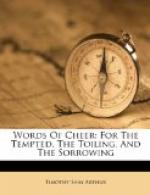“How are you this morning?”
Mrs. Endicott’s voice was low and sympathizing.
“I feel a little stronger, to-day, thank you,” answered Mrs. Adair, smiling as she spoke.
“How is your breast?”
“Still very tender.”
“And the pain in your side.”
“I am not free from that a moment.”
Still she smiled as she answered. There was not even a touch of sadness or despondency in her voice.
“Not free a moment! How do you bear it?”
“Happily—as I often say to myself—I have no time to think about the pain,” replied Mrs. Adair, cheerfully. “It is wonderful how mental activity lifts us above the consciousness of bodily suffering. For my part, I am sure that if I had nothing to do but to sit down and brood over my ailments, I would be one of the most miserable, complaining creatures alive. But a kind Providence, even in the sending of poverty to his afflicted one, has but tempered the winds to the shorn lamb.”
Mrs. Endicott was astonished to hear these words, falling, as they did, with such a confiding earnestness from the pale lips of her much-enduring friend.
“How can you speak so cheerfully?” she said. “How can you feel so thankful to Him who has shrouded your sky in darkness, and left you to grope in strange paths, on which falls not a single ray of light?”
“Even though the sky is clouded,” was answered, “I know that the sun is shining there as clear and as beautiful as ever. The paths in which a wise and good Providence has called me to walk, may be strange, and are, at times, rough-and toilsome; but you err in saying that no light falls upon them.
“But the sky is dark—whence comes the light, Mrs. Adair?”
“Don’t you remember the beautiful hymn written by Moore? It is to me worth all he ever penned besides. How often do I say it over to myself, lingering with a warming heart and. a quickening pulse, on every word of consolation!”
And in the glow of her fine enthusiasm, Mrs. Adair repeated—
“Oh, Thou, who dry’st the
mourner’s tear,
How dark this world would
be,
If, when deceived and wounded here,
We could not fly to Thee!
The friends, who in our sunshine live,
When winter comes, are flown;
And he who has but tears to give,
Must weep those tears alone.
But Thou wilt heal that broken heart,
Which, like the plants that
throw
Their fragrance from the wounded part,
Breathes sweetness out of
woe.
“When joy no longer soothes or cheers,
And e’en the hope that
threw
A moment’s sparkle o’er our
tears
Is dimmed and vanished, too,
Oh, who would bear life’s stormy
doom,
Did not Thy wing of Love
Come, brightly wafting through the gloom
Our Peace-branch from above?
Then sorrow, touched by Thee, grows bright
With more than rapture’s
ray
As darkness shows us worlds of light
We never saw by day.”




